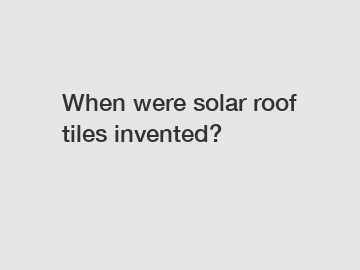When were solar roof tiles invented?
When Were Solar Roof Tiles Invented? Exploring the Evolution of Sustainable Energy.
Solar roof tiles have become a popular choice for homeowners seeking to harness the power of the sun and reduce their carbon footprint. But when were these innovative tiles actually invented? Let's delve into the fascinating history of solar roof tiles and explore their journey from dream to reality.
1. The birth of solar energy: Solar energy itself has been harnessed for centuries. However, it was not until the mid-19th century that photovoltaic (PV) cells, the building blocks of solar technology, were invented. These cells could convert sunlight into electricity, opening up a world of possibilities for renewable energy.

2. Early solar panel developments: The first solar panels, consisting of multiple PV cells wired together, were typically bulky and not suitable for rooftop installation. However, their inception laid the foundation for future advancements in solar technology.
3. The quest for aesthetically pleasing solar solutions: As solar panels gained popularity, there was an increasing demand for more visually appealing options that could seamlessly integrate with a building's design. This led to the development of solar roof tiles.
4. The birth of solar roof tiles: In 2005, a company called SRS Energy introduced the first-ever solar roof tiles, known as Solé Power Tiles. These tiles were designed to mimic traditional roofing materials while harnessing solar energy. Although a significant breakthrough, they still faced limitations in terms of efficiency and cost-effectiveness.
5. Tesla's game-changing innovation: In 2016, Tesla, the renowned electric vehicle manufacturer, acquired SolarCity, a major player in the solar industry. This strategic move paved the way for Tesla's foray into solar roof tiles. In collaboration with SolarCity, Tesla unveiled its iconic Solar Roof in 2017.
6. Tesla Solar Roof tiles: Tesla's Solar Roof consists of durable glass tiles with integrated solar cells. These tiles are designed to seamlessly blend with various architectural styles, making them an appealing choice for homeowners. The solar cells embedded within the tiles provide clean energy while effectively harnessing the power of the sun.
7. Advancements in efficiency and cost: Over the years, solar roof tiles have witnessed significant advancements in both efficiency and cost-effectiveness. As technology improves, solar cells become more efficient, resulting in increased energy production. Additionally, economies of scale and growing competition have contributed to a decline in the overall cost of solar roof tiles.
8. Growing popularity and adoption: As awareness about renewable energy and environmental sustainability increases, there has been a surge in popularity and adoption of solar roof tiles. Homeowners are increasingly embracing solar energy solutions as a means to reduce their carbon footprint and save on energy costs.
9. Overcoming challenges: Despite the growing popularity of solar roof tiles, there are still certain challenges to address. One major concern is the initial installation cost, which can be higher compared to traditional roofing materials. However, it is essential to consider the long-term savings in energy costs that solar roof tiles offer, making them a worthwhile investment.
10. The future of solar roof tiles: The future of solar roof tiles looks promising, with ongoing research and development focused on enhancing their efficiency, durability, and affordability. As technology continues to evolve, it is likely that solar roof tiles will become even more widespread and accessible in the coming years.
Are you interested in learning more about photovoltaic tiles roofing system, what is bipv, solar roof tiles melbourne? Contact us today to secure an expert consultation!

Comments
0